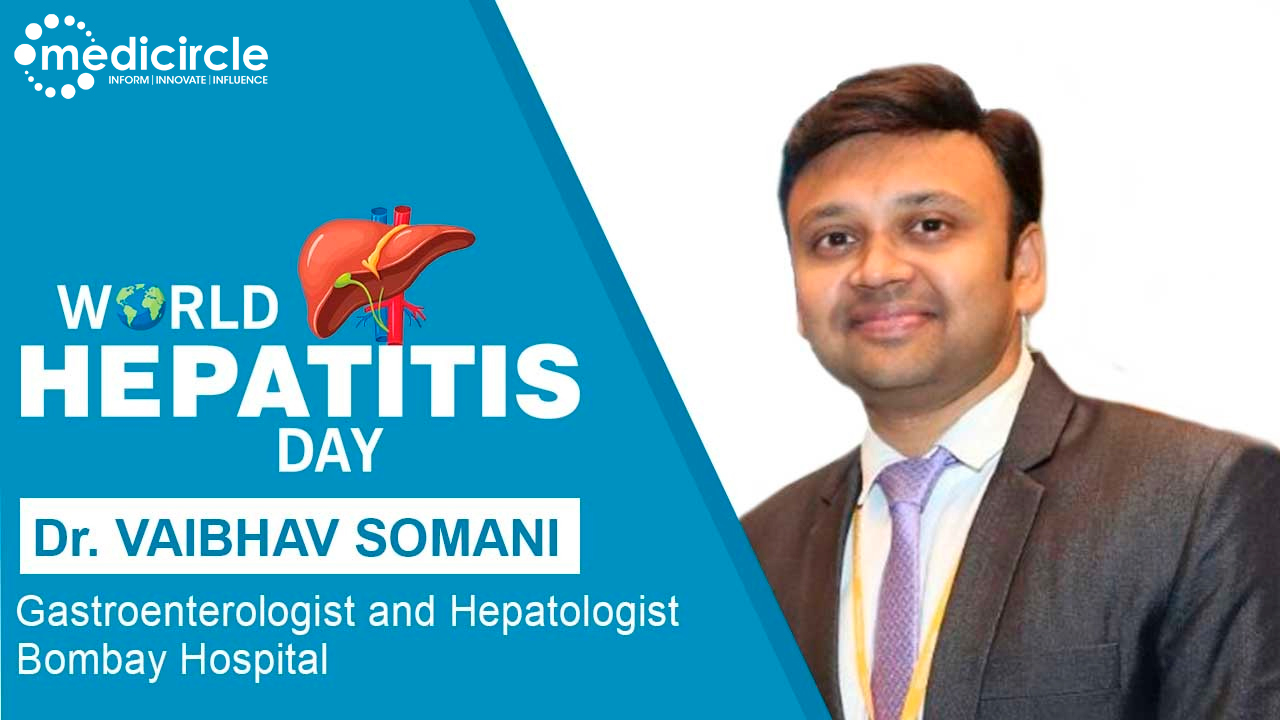According to WHO, Hepatitis is an inflammation of the liver that can cause a range of health problems and an estimated 325 million people worldwide live with hepatitis B or C. For most people, testing and treatment remain beyond reach. Medicircle is conducting a Hepatitis Awareness Series on the occasion of Hepatitis Awareness Month to spread information amongst people about the significance of testing for hepatitis, the availability of effective care and curative treatment, and the serious health consequences resulting from undiagnosed and untreated viral hepatitis.
Dr. Vaibhav Somani is a top gastroenterologist and hepatologist at Bombay hospital. He is the winner of the Asian Young Endoscopist Award in 2017 by the Korean Society of gastroenterology. He has a career spanning almost 12 years in various renowned hospitals of Delhi and Mumbai. His MBBS was followed by a DNB in internal medicine and then a specialization in gastroenterology. He has an analogical bent of mind and was an active co-investigator in phase three clinical trials. He's a published author of multiple articles, case reports, presentations, and the book.
Know the different types of Hepatitis
Dr. Vaibhav Somani says, “There are normally A, B, and C types of hepatitis. We'll talk about A, B, C, D, and E hepatitis and there is something called G - Hepatitis also, which is not seen much. The A and E hepatitis are all food or waterborne hepatitis with jaundice, which recovers on its own or sometimes on medication. They are not transmitted or maybe rarely transmitted by blood or any sexual contact. B and C hepatitis are the main viruses which are chronic viruses, which lie dormant in the body for many years without causing any symptoms. By the time the symptoms come they have already damaged the liver. So these two are very dangerous viruses and they are usually most commonly transmitted by mother to child or sexual transmission, and also by needlestick injuries in healthcare workers or by IV drug abuse and blood transfusions which is rare these days.”
Vaccination for hepatitis
Dr. Somani says, ”Amongst all the hepatitis viruses, the vaccination available is for A and B hepatitis. Other vaccinations are not available. So, hepatitis A has a very simple vaccination protocol and is available very easily. And I've been one of the Co-investigators in the clinical trials for hepatitis vaccine in Mumbai. The hepatitis B vaccine is included in our national immunization program for children and it is given to all the children at 1 to 6 months. There are three doses and we can take booster doses every five months. This is very important for healthcare workers like nurses and doctors who are in contact with the blood of patients and other body fluids of the patients. It is not very costly and easily available everywhere. All these two vaccines are available.”
Can diabetes or obesity aggravate hepatitis?
Dr. Somani informs, “Diabetes doesn't aggravate the chances of getting hepatitis. But yes, once a patient with long term diabetes, obesity may cause some liver damage, especially fatty liver or hepatitis. Diabetes and obesity with hepatitis may result in a more severe form of hepatitis, which is milder in patients who do not have diabetes or obesity. So these patients tend to have a more severe form of hepatitis and chances of liver damage are at high risk of complications.”
COVID and hepatitis
Dr. Somani states,” The patients with hepatitis B and C are at the high risk of developing COVID which may lead to more complications.”
(Edited by Dr.Rati Parwani)

 Dr. Vaibhav Somani talks about different types of hepatitis and emphasizes about Hep B and C being more common and chronic. He also states about the mandatory vaccination for children between 01-06 months which is included in the National Immunization Programme
Dr. Vaibhav Somani talks about different types of hepatitis and emphasizes about Hep B and C being more common and chronic. He also states about the mandatory vaccination for children between 01-06 months which is included in the National Immunization Programme





.jpeg)
.jpeg)
_(1)_(1)_(1).jpeg)



.jpeg)
.jpeg)
.jpeg)
.jpeg)





.jpeg)

.jpeg)

.jpeg)
.jpeg)
_(1).jpeg)
.jpeg)




